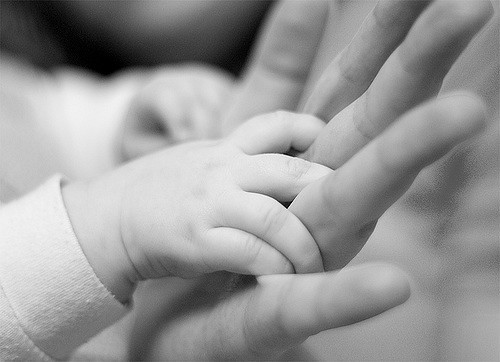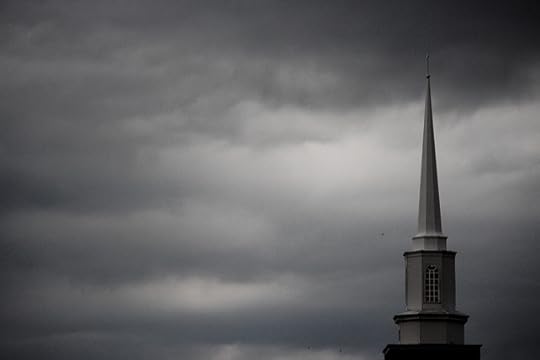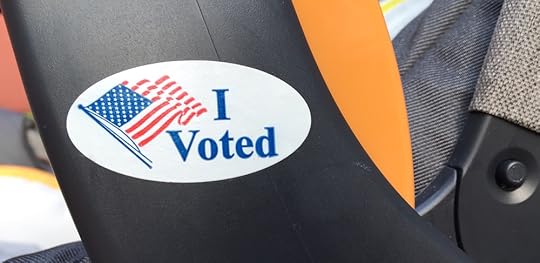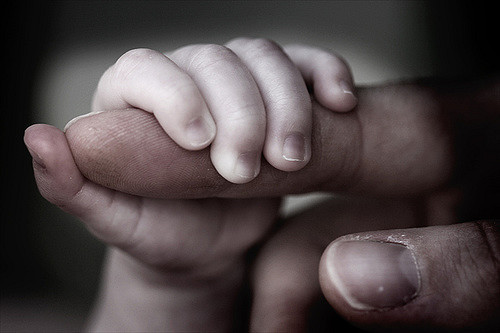Rachel Held Evans's Blog, page 3
January 13, 2017
2016 and the Risk of Birth

© 2006 Weird Beard, Flickr | CC-BY | via Wylio
My son entered the world to the sound of laughter.
February, 2016.
When you’ve been married for thirteen years, you know exactly what kind of humor your partner will appreciate when she’s actively pushing a baby out of her body, and Dan, sensing it would make me feel confident and safe, had the entire delivery room in stitches that night.
I don’t remember much of what he said, but I remember my OB laughed so hard I worried she’d drop the scissors as she passed them to Dan to cut the cord, and I remember being the happiest I’ve ever been when that little boy’s body was placed on my chest, all startled and slimy and mine.
A few days after my son’s birth, Donald Trump won the New Hampshire primary. They said he’d never win the nomination, so I didn’t worry too much. Our lives were utterly consumed with swaddling, nursing, burping, and maintaining the journal we meticulously updated with details of our baby’s diaper contents to report to the pediatrician because we were completely, unabashedly those parents.
The days and nights that followed were, as everyone always says, a blur. One can never prepare for the physical and emotional demands of caring for a newborn for the first time, and I was lucky to have a relatively smooth delivery and postpartum experience. The great thing about motherhood is that it demands the best of you, and then some. It demands more from than you ever knew you had, and it’s empowering to rise to that occasion, to learn something new about yourself.
Eventually, days became days again, and nights, for the most part, nights. (We still get the occasional 3 a.m. wake-up call.) The more mobile our little guy gets, the more we see of his personality—athletic, intrepid, clever, and curious, with a sophisticated sense of humor and a penchant for bluegrass.
I knew I would love this little boy, of course, but I had no idea I would like him this much.
Somewhere between our baby’s first laugh and his first clumsy crawl, Trump won the nomination. Just a few days before our baby’s first steps, Trump won the presidency.
November, 2016.
What a world my boy toddled into.
We like to refer to the “dumpster fire” of 2016. Memes abound (my favorite: “have you tried turning 2016 off and on again?”). From what seemed like a surge in celebrity deaths, to an especially divisive, racist and misogynistic election, to what is beginning to look like a global shift toward authoritarianism and xenophobia, we have good reasons to be sad, good reasons to be deeply concerned.
And yet, rolling around on the floor with my baby yesterday, his nose pressed against mine as he squealed with laughter, I was reminded once again that 2016 was, by far, the best year of my life.
Oh, it was the hardest year on my marriage, for sure, and on my body, my faith, and my ongoing battle against cynicism, but there is no doubt in my mind that 2016 will always be remembered as his year, the one that brought the world his first yawn, his first giggle, his first fall, his first Christmas, his first word.
2016 didn’t belong to Donald Trump, after all. That’s not something he can buy with his money or win with his pomposity.
We find ourselves in these strange juxtapositions from time to time, between the stories of our lives and the stories of the world around us. Sometimes they align with a sort of poetic symmetry—the gentle rain at the funeral on September 11, the divorce papers arriving the day you get the cancer diagnosis. Other times, the contrast is jolting—the baby cooing in your arms as news of another mass shooting scrolls across the TV, the wedding on Inauguration Day, 2017.
For me, the dissonance of this strange year is compounded by the fact that motherhood turned my bleeding heart into a hemorrhage. It’s as though I’ve become porous, my skin absorbing the pain of others, particularly other mamas and babies. (Speaking of which, why did all the good shows this year involve children in peril? I’m looking at you, “Stranger Things”!) Every night, as I nurse my boy in that cozy armchair in his nursery, I think of the Syrian mama nursing her baby in a raft adrift in the Mediterranean Sea. I think of the shell-shocked boy from Aleppo. I think of how every Latino kid taunted by classmates, every soldier sent to war, every autistic kid who will lose his therapy when ACA is repealed, every black man shot by police is somebody else’s baby boy, somebody else’s most important person in the world. I still, almost every day, think of Sandy Hook.
“Compassion is the sometimes fatal capacity for feeling what it is like to live inside somebody else's skin,” writes Frederick Buechner. “It's the knowledge that there can never really be any peace and joy for me until there is peace and joy finally for you too.”
Motherhood invited me into other people’s skin in a way I’ve never experienced before. So my joy is big and real and consuming, but also incomplete. I am overwhelmed by the conviction that every mother should be able to feed her baby like this, in safety and contentedness, and I am haunted by the reality that this is still far from the case.
In 2016, I became more aware than ever of the darkness around us, and more invested than ever in lighting the path.
In 2016, the world bared its teeth and my baby giggled back.
Blessedly, in the aftermath of the election, I had the occasion to revisit Madeleine L’Engle’s fantastic Genesis Trilogy, as I’ve been asked to write the foreword for a new edition. (If you want to know how I reacted to the honor of that request, watch Joe Biden win the Medal of Freedom for a visual approximation.)
One thing that struck me while re-reading the series was how forthcoming L’Engle is about her own fears around raising children during the Cold War.
“Planting onions that spring was an act of faith in the future,” she writes of one particularly worrisome season in And It Was Good. “for I was very fearful for our planet.”
“If I affirm that the universe was created by a power of love,” she continues, “and that all creation is good, I am not proclaiming safety. Safety was never part of the promise. Creativity, yes; safety, no. All creativity is dangerous…To write a story or paint a picture is to risk failure. To love someone is to risk that you may not be loved in return, or that the love will die. But love is worth that risk, and so is birth, its fulfillment.”
She refers, of course, to her famous Advent poem which begins:
This is no time for a child to be born,
With the earth betrayed by war & hate
And a comet slashing the sky to warn
That time runs out & the sun burns late.
And concludes:
When is the time for love to be born?
The inn is full on the planet earth,
And by a comet the sky is torn-
Yet Love still takes the risk of birth.
This was a strange year to have a baby.
Perhaps, for you, it was a strange year to lose your father, to be ordained, to become a citizen.
But if the incarnation has anything to say about it, we don’t get to wait around for ideal circumstances to begin creating, birthing, nurturing, planting, protesting, and working together to heal the world.
So my prayer for you today, and in the days, weeks, and months ahead, is this: No matter what it means to you, take the risk of birth. Don’t be afraid.
Finish the book. Pursue the relationship. Begin the ministry. Push the boundaries. Join the march. Write the screenplay. Do the dishes. Plant the onions. Carry the child. Roll around on the floor with your giggling toddler as if the world was even fractionally worthy of his presence.
I’m so glad I did.



January 11, 2017
See you in Leawood, KS; the mountains of North Carolina; and your living room!

© 2016 David Hilowitz, Flickr | CC-BY | via Wylio
This winter’s speaking schedule will take me as far as Leawood, Kansas for a women’s conference with my friend Sarah Bessey, and as close as my home office for a writing workshop on engaging social media. It will also take me to the mountains of North Carolina—Hendersonville and Banner Elk—and, in March, to Haddonfield, New Jersey and Greenwich, Connecticut.
I'm excited because at most of these events, I'll have the opportunity to speak from my new book, presently titled "Bible Stories," which is still in progress and for which I'd love to solicit feedback.
Below is my schedule for January—March. You can check out the rest of the 2017 schedule here. Looking forward to meeting many of you in person!
January
31: Live Webinar
Writing For Your Life: Author Platform Development Through Social Media
“How To Turn Hate Mail Into Origami: Engaging Your Readers in the Internet Age”
More Information
February
3-4: Leawood, Kansas
Inspired For Life Women’s Retreat (with Sarah Bessey)
Church of the Resurrection
More Information
17-19: Hendersonville, North Carolina
Kanuga Church Leadership Conference: “Finding Your Place”
More Information
21-22: Banner Elk, North Carolina
Lees McRae College
More Information
March
10-11: Haddonfield, New Jersey
Lutheran Church of Our Savior
More Information
25-16: Greenwich, Connecticut
Christ Church Greenwich
Courage & Faith Series
More Information



See you in Gainesville, GA; Leawood, KS; the mountains of North Carolina; and your living room!

© 2016 David Hilowitz, Flickr | CC-BY | via Wylio
This winter’s speaking schedule will take me as far as Leawood, Kansas for a women’s conference with my friend Sarah Bessey, and as close as my home office for a writing workshop on engaging social media. It will also take me to the mountains of North Carolina—Hendersonville and Banner Elk—and, in March, to Haddonfield, New Jersey and Greenwich, Connecticut.
The first event is just days away in Gainesville, Georgia. I’ll be speaking on women, faith, doubt, and journeying through the wilderness for The Summit Women’s Weekend at First Baptist Church Gainesville. So if you need a distraction on Inauguration Day weekend, join us!
I'm excited because at most of these events, I'll have the opportunity to speak from my new book, presently titled "Bible Stories," which is still in progress and for which I'd love to solicit feedback.
Below is my schedule for January—March. You can check out the rest of the 2017 schedule here. Looking forward to meeting many of you in person!
January
20-21: Gainesville, Georgia
The Summit Women’s Weekend: First Baptist Church Gainesville
More Information
31: Live Webinar
Writing For Your Life: Author Platform Development Through Social Media
“How To Turn Hate Mail Into Origami: Engaging Your Readers in the Internet Age”
More Information
February
3-4: Leawood, Kansas
Inspired For Life Women’s Retreat (with Sarah Bessey)
Church of the Resurrection
More Information
17-19: Hendersonville, North Carolina
Kanuga Church Leadership Conference: “Finding Your Place”
More Information
21-22: Banner Elk, North Carolina
Lees McRae College
More Information
March
10-11: Haddonfield, New Jersey
Lutheran Church of Our Savior
More Information
25-16: Greenwich, Connecticut
Christ Church Greenwich
Courage & Faith Series
More Information



November 14, 2016
Life After Evangelicalism

© 2012 Elizabeth Ashley Jerman, Flickr | CC-BY | via Wylio
I drafted my divorce papers with evangelicalism a long time ago.
— Brandi Miller (@BrandiNico) November 9, 2016
Tonight I serve them.
This is for everyone who stayed home from church yesterday—for every mom of a special needs kid, every survivor of sexual assault, every black or brown body in a predominantly white community, every son or daughter of an immigrant, every defender of the marginalized who just couldn’t bring yourself to stand and sing “Great Is Thy Faithfulness” alongside the people you feel sold you out this week, the Christians who supported Donald Trump.
Please hear me:
You are not alone.
You are not alone in your grief.
You are not alone in your anger.
You are not alone in your doubt, frustration, and fear.
The community that introduced you to Jesus—that baptized you and named you a beloved child of God—has aligned itself with values you don’t recognize, powers that oppress.
It’s an enormous blow, and it’ll knock the wind right out of you.
Your disillusionment with the Church may seem like a petty wound to nurse right now, with Latino children getting taunted by their classmates, Muslim communities facing religious persecution, and black families grappling with a world in which white nationalism has been validated and emboldened, but grief is grief.
And your grief is real and justified.
The stark reality is that most white Christians, including more than 80 percent of white evangelical Christians, supported Donald Trump for president, despite his evident immorality, bigotry, and disregard for the dignity of women, (not to mention complete lack of qualification or competency). We’re about to witness firsthand what happens when the established Church compromises its moral authority for the promise of power, and it won’t be pretty. I predict millennials in particular will continue to drop out of religious life, and the ethnic divides within American Christianity, which many sought to heal with a quick-fix approach to "racial reconciliation" that bypassed repentance and justice, will only widen.
There’s an op-ed out every minute urging the bewildered to get out of their bubbles and get to know some Trump supporters, but you don’t need to do that, do you?
These are the people you worship with each week, the people whose kids hang out with your kids, the people who brought you a chicken casserole when you had surgery, the people you call with good news, the people you’re now wishing you’d spoken with more bluntly, more honestly.
They aren’t strangers to you, are they? But suddenly, you are a stranger among them.
And that’s a lonely place to be.
I know because I’ve been there. I’ve stood in a sanctuary singing songs I didn’t feel like singing, pretending to agree with a political ideology I no longer agreed with, praying to a God I wasn’t sure I believed in anymore. It whittles down your spirit, a little at a time, until one day you realize it’s not you going to church anymore, but some ghost of you, some cardboard cutout you send out to maintain the status quo, to keep up appearances. The sense of isolation is profound, palpable.
You have some decisions up ahead, the most pressing of which is to stay or to go.
I'm not going to tell you what to do about that.
When writing about her troubled marriage, author Glennon Melton wisely avoids telling other women what to do, and instead puts the choice this way:
“Does a Love Warrior Go? YES. If that’s what her deepest wisdom tells her to do. Does a Love Warrior Stay? YES. If that’s what her deepest wisdom tells her to do. Both roads are hard. And both roads can lead to redemption.”
The same is true for church. There is no single road to redemption. And there is certainly not a straight one. As novelist Marilynne Robinson has said, “grace is not so poor a thing that it cannot present itself in any number of ways.”
Perhaps you will stay and work for reform. Perhaps you will leave to join a new community, another tradition. Perhaps you won’t know for a while.
But I think we both know something has to change.
I eventually left evangelicalism when it became clear that the fight was wearing me down, with little promise of change, especially as it concerned my LGBT friends and neighbors. After a few years of wilderness wandering (you should expect that, by the way---look for the manna; look for the water from rock), I found myself in the Episcopal Church, which is no less riddled with conflict and shortcomings than any other Christian tradition, but which introduced me to the sacraments that have managed to sustain my ever-complicated, ever-faltering faith.
I’m telling you this because I want you to know there is life after evangelicalism.
Perhaps you’ve been told for as long as you can remember that the rest of the world is dark and evil, and that progressive Christianity is full of faithless, lukewarm liberals. But that’s not true. Not by a long shot.
You see those churches on TV getting defaced by swastikas and racial slurs? Why do you think they’ve been targeted?
Because those churches are inclusive and diverse. Because the love inside is so magnetic, so real, so threatening to powers and principalities, even the Devil knows it.
The Church universal is so much bigger than white American evangelicalism, and that’s going to become ever more apparent in the months and years to come.
The good news is that Jesus is already on the margins. Jesus is already present among the very people and places our president-elect despises as weak. When we stand in solidarity with the despised and the suffering, Jesus stands with us. We don't have to abandon Jesus to abandon the unholy marriage between Donald Trump and the white American Church. In these troubled times, a prophetic resistance will certainly emerge, made up of clergy, activists, artists, humorists, liturgists, parents, teachers, and volunteers committed to partnering with and defending "the least of these." I found my faith again in the margins—through the Gay Christian Network, for example, and among fellow doubters and dreamers who limp from their wrestling with God—and I’ll be amplifying and supporting these efforts even more as they face potential new threats under this administration. I hope you will join us.
But you should know that as you take those first shaky steps toward something new, grief will stalk along, catching you by surprise.
Losing your first faith is like losing a dear family member or friend, and as with any other death, you sense its absence most profoundly in those everyday moments when it used to be present—in a beloved hymn, in a Bible verse or prayer, in a strained relationship that used to be so easy.
Certainly many are suffering right now, and your crisis of faith may pale in comparison. There are a lot of other things I want to write about and advocate for now, but I wanted to say this first:
You are not alone.
There is life after this. There is faith after this.
Hold on.



October 28, 2016
Next Stop: Atlanta

© 2006 TimothyJ, Flickr | CC-BY | via Wylio
I’ll be speaking about the Church, death, and resurrection at Trinity Presbyterian Church in Atlanta on Friday, November 4. The event should leave ample time for Q&A, conversation, and book signings. Tickets are $20/$15 student. See you there!



October 17, 2016
See you in Shreveport!

© 2009 Shreveport-Bossier Convention and Tourist Bureau, Flickr | CC-BY | via Wylio
I’m headed to Shreveport, Louisiana this week—October 23-24— to speak at First Presbyterian and St. Mark’s Cathedral. Here’s the schedule:
Sunday, October 239:30 a.m.
Adult Sunday School at First Presbyterian Church
“My Year of Biblical Womanhood”
10:45 a.m.
Sermon from the Lectionary at First Presbyterian Church
“Thank God I’m Not Like Them”
7 p.m.
Evening Lecture (Flora and Spencer Murray Lecture Series) at St. Mark’s
“Keep the Church Weird”
12:00 p.m.
Lunchtime Lecture at First Presbyterian Church
($10/person with lunch)
Q&A + a reading from the new book-in-progress
7 p.m.
Evening Lecture at St. Mark’s
“Keep the Bible Weird”
More info here. Hope to see you there!



August 22, 2016
See you in South Bend, Mobile, Chicago, Atlanta, and…your living room
With a book to finish and a six-month-old to entertain, I’m keeping my fall schedule pretty light this year. The nice thing about being selective, though, is I get to participate in some pretty cool events—including the second annual Why Christian? conference I’m hosting with my friend Nadia Bolz Weber, a panel discussion on women and the church with Sister Simone Campbell and Mary Rice Hasson at the University of Notre Dame, trips to Mobile and Atlanta, and a writing webinar you can join from your living room. I’ve posted the full schedule with details below. Check the schedule page for updates. (In the spring I’ll be in North Carolina, Georgia, New Jersey, Connecticut, Kansas, Michigan, and Arkansas, among other places.)
Tuesday, September 13
“Who Do You Think You Are? – Writing a Meaningful Memoir in an Over-share Age”
Writing For Your Life Webinar
More Info
Thursday, September 22
"Women and the Church: an Inter-Tradition Dialogue"
University of Notre Dame: South Bend, Indiana
More info
Saturday, September 24 - Sunday, September 25
Dauphin Way United Methodist Church: Mobile, Alabama
More info
Thursday, September 29 – Saturday, October 1
Why Christian? Conference
Chicago, Illinois
More info
Friday, November 4
Trinity Presbyterian Church: Atlanta, Georgia
More info



See you in South Bend, Mobile, Chicago, Shreveport, Atlanta, and…your living room
With a book to finish and a six-month-old to entertain, I’m keeping my fall schedule pretty light this year. The nice thing about being selective, though, is I get to participate in some pretty cool events—including the second annual Why Christian? conference I’m hosting with my friend Nadia Bolz Weber, a panel discussion on women and the church with Sister Simone Campbell and Mary Rice Hasson at the University of Notre Dame, trips to Mobile and Atlanta, and a writing webinar you can join from your living room. I’ve posted the full schedule with details below. Check the schedule page for updates. (In the spring I’ll be in North Carolina, Georgia, New Jersey, Connecticut, Kansas, Michigan, and Arkansas, among other places.)
Tuesday, September 13
“Who Do You Think You Are? – Writing a Meaningful Memoir in an Over-share Age”
Writing For Your Life Webinar
More Info
Thursday, September 22
"Women and the Church: an Inter-Tradition Dialogue"
University of Notre Dame: South Bend, Indiana
More info
Saturday, September 24 - Sunday, September 25
Dauphin Way United Methodist Church: Mobile, Alabama
More info
Thursday, September 29 – Saturday, October 1
Why Christian? Conference
Chicago, Illinois
More info
Sunday, October 23
First Presbyterian Church on Jordan Street
Monday, October 24
St. Mark’s Episcopal Cathedral
Shreveport, LA
Friday, November 4
Trinity Presbyterian Church: Atlanta, Georgia
More info



August 2, 2016
So you’re thinking of voting for a pro-choice candidate...

I’m pro-life.
Or, put another way, I believe the sacred personhood of an individual begins before birth and continues throughout life, and I believe that sacred personhood is worth protecting, whether it’s tucked inside a womb, waiting on death row, fleeing Syria in search of a home, or playing beneath the shadow of an American drone.
I’ve also voted for both pro-life and pro-choice candidates for political office, including Barack Obama in 2012 and 2008, and George W. Bush in 2004 and 2000.
So I speak as someone who has struggled with, and in some cases regretted, her decisions at the ballot box, and who recognizes no single political party boasts a consistent pro-life ethic, just as no single political party embodies the teachings of Jesus or the values of his Kingdom. (If you think this is the first year your vote fails to reflect Christian principles, I’ve got some bad news.) I speak too as someone acutely aware of the inconsistencies and uncertainties in my own pro-life convictions, which continue to be challenged and changed in the midst of lived experience.
While I’ve written in the past about feeling caught between the pro-life and pro-choice camps, I’ve never used my platform to endorse a presidential candidate. But as so many others have said, this year is different. Knowing many of my pro-life friends feel torn between voting for an unpopular but highly qualified pro-choice candidate in Hillary Clinton and an incompetent narcissist who poses a unique threat to our American democracy in Donald Trump, I’d like to make a proposal:
You should vote for Hillary Clinton.
And I’d like to suggest that voting for a pro-choice candidate in this election, or any election, need not overburden your conscience.
Here’s why:
In the eight years since we’ve had a pro-choice president, the abortion rate in the U.S. has dropped to its lowest since 1973. I believe the best way to keep this trend going is not to simply make it harder for women to terminate unwanted pregnancies but to create a culture with fewer unwanted pregnancies to begin with. Data suggests progressive social policies that make healthcare and childcare more affordable, make contraception more accessible, alleviate poverty, and support a living wage do the most to create such a culture, while countries where abortion is simply illegal see no change in the abortion rate.
By focusing exclusively on the legal components of abortion while simultaneously opposing these family-friendly social policies, the Republican Party has managed to hold pro-life voters hostage with the promise of outlawing abortion, (which has yet to happen under any Republican administrations since Roe v. Wade), while actively working against the very policies that would lead to a significant reduction in unwanted pregnancies.
So even though I think abortion is morally wrong in most cases, and support more legal restrictions around it, I often vote for pro-choice candidates when I think their policies will do the most to address the health and economic concerns that drive women to get abortions in the first place. For me, it’s not just about being pro-birth; it’s about being pro-life. Every child deserves to live in a home and in a culture that welcomes them and can meet their basic needs. Every mother deserves the chance to thrive. Forcing millions of women to have children they can’t support, or driving them to Gosnell-style black market clinics, will not do. We have to work together—pro-life and pro-choice, Democrat and Republican, conservative Christian and progressive Christian—to create a culture of life that celebrates families and makes it easier to have and raise kids. This is the only way to make our efforts at rarifying abortion truly sustainable.
This year, Hillary Clinton has better policy proposals to help improve the lives of women, children, and families than Donald Trump, whose pro-life convictions are lukewarm at best, and whose mass deportation plan would rip hundreds of thousands of families apart, whose contempt for Latinos, Muslims, refugees and people with disabilities would further marginalized the “least of these” among us, and whose support for torture and targeting civilians in war call into question whether Christians who support him are truly pro-life or simply anti-abortion.

photo by Adam Schultz
(It should be noted that Gary Johnson, whose name I hear a lot from evangelical voters, is also pro-choice. For my thoughts on voting third party, see the comment section below. And for a similar take on all this, but from the perspective of a pro-life activist with special needs kids, be sure to read Shannon Dingle’s post, “I'm pro-life. And I'm voting for Hillary. Here's why.” It’s excellent.)
Those are my views in summary, but I’d like to unpack them in four main points:
First, voting pro-choice is not the same as voting for abortion.Regarding the 2016 election, the Washington Post recently declared that “for evangelicals, the question has become: which is a worse sin, abortion or racism?” While the people quoted within the article offer far more nuanced perspectives, the headline betrays a common but reductive sentiment—that people who vote for pro-choice candidates are voting for abortions. I can’t tell you the number of times I’ve been called a “baby killer” by conservative Christians, some of whom routinely sent me images of mutilated fetuses during my pregnancy, which is no way to treat any woman, regardless of her views on abortion.
But characterizing all pro-choice voters as pro-abortion is inaccurate and unfair. In fact, a majority of Americans (56%) say abortion should be legal in most cases, even though nearly half (49%) believe it is immoral. Even those numbers don’t tell the whole story. While it would be easier to debate one another if reproductive issues fell neatly into black-and-white categories of right and wrong, good and evil, most of us recognize this is simply not the case. The fact that a woman’s body naturally rejects hundreds of fertilized eggs in her lifetime raises questions about where we draw the line regarding the personhood of a zygote. Do we count all those “natural abortions” as deaths? When does personhood begin—at fertilization? implantation? the presence of brainwaves? the second trimester? There is disagreement among Christians about this, (and historically, even among evangelicals), so is it really my place, or the government's job, to impose my beliefs on people of all faiths and convictions? If abortion is criminalized, should every miscarriage be investigated by police? Should in vitro fertilization be outlawed? Most of us would question whether this couple should have been forced to deliver their stillborn baby, or this woman told by her insurance company that terminating a desperately wanted but unviable pregnancy counted as an abortion. Given the complex nature of these and other issues, the degree to which the government should make decisions on behalf of women and families regarding pregnancy is, and should be, debatable.
I think it’s safe to say that few people who vote for Hillary Clinton this year will do so because they want the abortion rate to go up. Every person I’ve spoken with personally, whether pro-life or pro-choice or somewhere in between, wants to see abortions reduced. That said, I’m concerned by efforts from some in the democratic party to move beyond the “safe, legal, and rare” posture on abortion to one that treats it as just another routine health procedure. (The recent “comedians in cars getting abortions” sketch is a troubling reflection of this trend.) I intend to speak out about this, and other concerning changes to the democratic platform, and would encourage other pro-life progressives to do the same.
Second, criminalizing abortion won’t necessarily reduce abortions.
Recent data published by The Lancet journal shows that countries where abortion is illegal or heavily restricted—mainly in Africa and Latin America— don’t have lower abortion rates than the rest of the world. In those countries, the rate is 37 abortions per 1,000 women, compared to 34 per 1,000 in countries where it is legal. In fact in Latin America, a region with highly restrictive abortion laws, one in three pregnancies (32%) ended in abortion in 2010--2014, higher than any other region.
[Read: "The Surprising New Findings That Could Reshape the Pro-Life Movement"]
This data underscores an important reality: that women will continue to seek out abortions even if they are illegal. This was certainly true in the U.S. before Roe v. Wade, and remains true for women who resort to dangerous and clandestine methods of terminating pregnancies in countries where it is illegal.
Still, we have to be careful of comparing apples to oranges when it comes to the statistics. Most of the countries where abortion is illegal also suffer from widespread poverty and limited access to contraception—huge drivers in the abortion rate. In addition, some surveys show that here in the U.S., states with more abortion restrictions do in fact have lower abortion rates, suggesting legal changes may indeed have some effect.
So, with those considerations in mind, I think it’s safer to say that while legal restrictions on abortion might put a dent in the abortion rate, they won’t put an end to abortion as we know it, and, most importantly, they won’t do a thing to alter the number of unwanted pregnancies. Rather than waiting around for a hypothetical and unlikely legal scenario to play out, our efforts would be better spent working to decrease the number of unwanted pregnancies using the tools we already have…which brings me to my next point.
Pro-life advocates should support, rather than oppose, efforts to help low-income families care for their children.
When President Obama recently announced an initiative aimed at improving the distribution of free or low-cost diapers to poor families struggling to care for their babies, many conservatives sneered, calling it the ultimate example of a “nanny state.”
It was frustrating to see an idea that was so obviously pro-life and pro-family get lampooned by the very people who say they want millions of low-income women to have millions more babies. I know I’m not the only one who gets red faced whenever a self-proclaimed pro-life politician or pastor belittles and demeans “welfare queens” and “moocher moms,” seemingly unaware of the hypocrisy of forcing women to have children they can’t afford while simultaneously dismantling the social safety net helps them care for those children.
The fact is, most women who choose to have abortions do so because they feel they cannot manage the financial burden of carrying out the pregnancy and raising another child. The latest survey from Guttmacher found that 49% of abortion patients in 2014 had incomes of less than 100% of the federal poverty level ($11,670 per year) and 26% had incomes of 100-199% of the federal poverty level. The survey reports, “the reasons patients gave for having an abortion underscored their understanding of the responsibilities of parenthood and family life. The three most common reasons—each cited by three-fourths of patients—were concern for or responsibility to other individuals; the inability to afford a child; and the belief that having a baby would interfere with work, school or the ability to care for dependents.”
Imagine you’re a mother of two working 40 hours a week at a minimum wage job in food service, while your husband hunts for a job. (At $7.25 per hour, that works out to $15,080 a year.) Childcare takes about 30 percent of those earnings, rent groceries and other bills the rest. Now imagine that, like a third of American workers, you don’t get any paid sick days, so every time one of your children gets an ear infection or catches the flu, your pay is docked for taking time off to care for them. Imagine too that you can barely afford your health insurance, much less days off for doctor visits, and your employer doesn’t offer any paid maternity leave.
Now imagine you get pregnant…
This is the reality faced by millions of women who consider abortions each year, and the sad irony is the same pro-life politicians who want to force them to have their babies typically oppose raising the minimum wage, ensuring paid sick leave and parental leave for all American workers, and protecting the 20 million people who can finally afford health insurance thanks to the Affordable Care Act. They also tend to oppose additional funding for successful programs like WIC, which provides food assistance to low-income pregnant and postpartum women and their children.
[Read: "The Pro-Life Case for Paid Maternity Leave"]
[Watch: Jessica Shortall on “How America Fails New Parents and Their Babies]
Creating a culture of life isn’t just about standing in a picket line with a “Choose Life” sign. It’s about seriously addressing the problem of income inequality in this country so that no woman has to choose between getting an abortion or raising her child in poverty. It means celebrating parenthood by making America the most generous country in the developed world when it comes to maternity and paternity leave, not the least generous, and it means working together on efforts to reduce the costs of food, diapers, childcare, pediatrician visits, college tuition, adoption, and resources for special needs children.
Like her or not, agree with her or not, Hillary Clinton has devoted much of her life to tackling these very issues, and she’s made them a centerpiece of her campaign. (Check out Shannon’s post for more on this.) Some of Clinton’s plans include guaranteeing 12 weeks of paid family and medical leave, expanding early childhood education, capping childcare expenses at 10 percent of a household’s income, helping the families of children with autism and other special needs get access to more resources and support, and insuring more families through the Affordable Care Act. In the past, she has worked with Republicans on legislation that reformed the foster care system and encouraged more adoptions, issues I know matter to many pro-life evangelicals who advocate on behalf of adoption and open their homes to children.

© 2006 David Swait, Flickr | CC-BY | via Wylio
Sometimes I think it’s easier for us to talk about “saving millions of babies” than it is to work at creating a culture that can sustainably welcome those babies as they grow into children and adults. Speaking in abstract terms about blank, amorphous “innocent lives” keeps us from confronting the reality that if most of these children are born at or near the poverty line, then the lives we are saving are more likely to be troubled ones, and if nothing changes, those lives will get caught in vicious cycles powered by poverty and systemic racism. If today’s “innocent human life” is tomorrow’s “welfare queen,” you might want to consider whether your convictions are truly pro-life or simply pro-birth. Will your fight for life continue when those babies grow up and the lives we’re talking about are kids stuck in the foster care system or in failing schools, teenagers struggling with addiction, immigrants looking for work, or young black men worrying that a traffic stop might end their lives?
Thinking holistically about pro-life values means thinking beyond the labor and delivery unit. If we don't address income inequality in this country, and if we don't support robust plans to improve healthcare and education, we simply can't sustain the very lives we're advocating be protected.
Fourth, (and I’ve made this point so often before I won’t belabor it), if we want to dramatically reduce the abortion rate in this country, we must support efforts to make contraception more accessible and affordable.
Study after study after study shows this to be true.
Not only would improved access to contraception impact the abortion rate in the U.S., it would dramatically reduce maternal and infant deaths around the world. There are more than 220 million women in developing countries who don’t want to get pregnant, but who lack access to family planning information and contraceptives. Every year, nearly 300,000 of them will die during pregnancy or from complications giving birth, and many more will be permanently disabled. More than 2.6 million babies will be stillborn, and another 2.9 million will die before they are a month old.
As Melinda Gates explains in here, giving women the opportunity to time their pregnancies and space out their children through effective, low-cost contraception is key to turning these numbers around. Some estimate it could save as many as 2 million children every year, and dramatically curb maternal mortality rates.
If that isn’t pro-life, I don’t know what is.
[Read: “The Birth Control Debate We Shouldn’t Be Having”]
[Watch: "Melinda Gates: Contraception is Not Controversial"]
Finally, a word to evangelicals about Donald Trump…
According to Pew Research Center, white evangelical Christians overwhelmingly support Donald Trump for president. A solid 78 percent plan to vote for him. While a few prominent evangelical leaders have spoken out against Trump’s character and polices, others have endorsed him as evangelical’s best bet for retaining power and influence over the culture. Some evangelicals have gone so far as to declare Trump “born again,” even though he says he has no need for God’s forgiveness.
[Read: "Donald Trump and a Tale of Two Gospels"]
If these numbers hold, and on election night a reporter looks into a camera and says evangelical Christians proved Trump’s most faithful supporters, the reputation of the evangelical movement will be tied to Trump for years to come. This will put evangelicals in the difficult position of having to explain…
- how you can claim God’s love for kids with special needs while supporting a man who openly mocks people with disabilities,
- how you can oppose sexual immorality while shrugging off the transgressions of a strip club owner who brags about his sexual exploits and extramarital affairs and who publicly sexualized both of his daughters,
- how you can make grand announcements about your efforts to move toward racial reconciliation while working to elect as president a man people in his own party acknowledge is racist, and who is widely supported by white supremacist groups,
- how you can appeal to “religious liberty” to justify denying wedding cakes to gay and lesbian couples without challenging a candidate who wants to increase surveillance of Muslim neighborhoods, create a database of Muslim citizens, and ban Muslims from visiting the U.S., which would suggest the only “religious liberty” you want to protect is your own,
- how you can claim your conservative views on women’s roles aren’t anti-woman while supporting a misogynist who says he likes to have a “young and beautiful piece of ass” on his arm, calls women “bimbos” and “fat pigs,” and distributed unflattering pictures of a political opponent’s wife as a campaign tactic,
- how you can claim it’s unfair to characterize evangelicals as anti-intellectual while following a man who believes conspiracy theories from the National Enquirer, thinks climate change is a hoax, says vaccines cause autism, and displays such breathtaking ignorance regarding the state of the world and foreign policy that no former presidents will endorse him and multiple generals, foreign policy experts, editorial boards, and heads of state have denounced him as dangerously uninformed,
- how you can quote Bible verses about “welcoming the stranger” while supporting a candidate who wants to turn away desperate refugee families,
- how you can call yourself “family values” voters while supporting Trump’s mass deportation, which would orphan or displace 4.5 million children who are U.S. citizens but who have at least one parent who is an undocumented immigrant,
- how you can claim it’s a “morally good choice” to elect a president who wants to bring back waterboarding and other forms of torture, who wants to target the families of terrorists because “that’s what they do to us,” and who admires the tactics of Vladimir Putin and Saddam Hussein
As Richard Rohr said, “the evangelical support of Trump will be an indictment against its validity as a Christian movement for generations to come.”
Evangelicals, I implore you: Don’t support Donald Trump. Don’t support a racist demagogue who can’t even quote a single Bible verse properly and who takes to Twitter to viciously insult everyone he disagrees with. He’s playing you. Whatever promises he’s made regarding Supreme Court appointments should be weighed against a pattern of lies and failure to follow-through (hello, tax returns?).
Donald Trump is not your pro-life savior.
Of course, neither is Hillary Clinton.
But Clinton is far better positioned to keep the abortion rate at the record low it saw under President Obama while the Republican Party works for the next four years to produce the kind of candidate the people of this country deserve.



July 6, 2016
God Needs Women

© 2011 Waiting For The Word, Flickr | CC-BY | via Wylio
Occasionally, in conversations about God and gender, someone will attempt to conclude the matter by noting that Jesus was a man, as though the incarnation proves something about the gender of God or the ultimate superiority of maleness over femaleness.
I’ve never really known how to respond to that, but lately, as I’ve been nursing a five-month-old baby boy, I’ve been thinking: Yes, in Jesus, God was once a man. But also? In Jesus, God was once a baby—a baby who nestled in a woman’s womb, a baby whose life depended on a woman for nourishment, a baby who fell asleep on a woman’s chest, a baby whose first word could very well have been, “mama.”
Think about that. God kicking through a woman’s pregnant belly, God nursing from a woman’s breasts, God furrowing his brow and concentrating with all his might to form the word “mama,” God releasing a cute baby belly laugh, God wailing late into the night.
The miracle of the incarnation isn’t that God became a man; it’s that God became human—with all of a human’s weaknesses, dependencies, and interconnectedness. If anything, the incarnation reminds us just how much we belong to one another and need one another, how our shared humanity means no one is more important by virtue of gender or status.
Sure, when God became flesh, God became a man. But that man was once a baby who needed his mama. And that baby grew into a man who surrounded himself with women who were his students, his ministry partners, and his friends. And when that man was crucified and buried and abandoned by men, it was the women who came with the spices, the women who got the first glimpse of resurrection.
Like it or not, God needs women—for food, for friendship, for the work of redemption.
Sojourner Truth put it far more bluntly when she (reportedly) said: “Then that little man in black there, he says women can't have as much rights as men, 'cause Christ wasn't a woman! Where did your Christ come from? Where did Christ come from? From God and a woman! Man had nothing to do with Him.”



Rachel Held Evans's Blog
- Rachel Held Evans's profile
- 1710 followers



